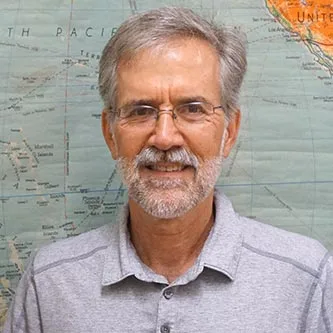Background
My development into a professional archaeologist and educator was a natural outcome of my youthful involvement in various outdoor activities (e.g., backpacking) where I encountered wilderness landscapes (in Texas and New Mexico) and archaeological materials. These experiences intersected with my early childhood interest in the lives and technologies of past peoples and cultures throughout the world. My eventual awareness that these two interests (i.e., nature and archaeology) could be experienced in a career that combined teaching and research compelled me to become a professional archaeologist. As a consequence, I have engaged in archaeological fieldwork and teaching in the American Southwest (Arizona) and in Oceania (Hawaiʻi, Mariana Islands, and American Samoa).
Education
- PhD, Arizona State University, 1994
- MA, Northern Arizona University, 1988
- BA, Miami University, 1979
Courses
- ANTH 151: Emerging Humanity
- ANTH 210: Archaeology
- ANTH 323: Pacific Islands Archaeology
- ANTH 668: Archaeology Field Methods
- ANTH 711: Seminar in Research Design and Proposal Writing
Research
My research focuses on three areas of the Pacific: Hawaiʻi, the Marianas, and American Samoa. The Hawaiian and Marianas research integrates archaeological, documentary, and traditional sources of knowledge to interpret the consequences of contact between indigenous and non-indigenous populations. Investigating the intersections of technology and social identity is a cornerstone of my ongoing research. Archaeology provides a unique perspective for the historical anthropology of early modern colonialism in Oceania: it illuminates cultural practices that are documented in (or were forgotten or censored from) written and oral accounts. This comparative research investigates similarities and differences in Spanish and Euro-American colonialism in the Marianas and Hawaiʻi, respectively.
Community Engagement
Community engagement, teaching, and research are inseparable dimensions of my career as an academic archaeologist. I have conducted field research in partnership with descendant communities and other institutions including the Guam Preservation Trust (GPT), the University of Guam Micronesian Area Research Center (MARC), the Commonwealth of the Northern Mariana Islands, the National Park Service of American Samoa (NPSA), the Japanese Cultural Center of Hawaiʻi (JCCH), and Kamehameha Schools (KS). Capacity-building of local residents and other stakeholders to document, preserve, and celebrate their heritage is central to my teaching, research and community service; my graduate students are actively-involved in these community engagement endeavors.
